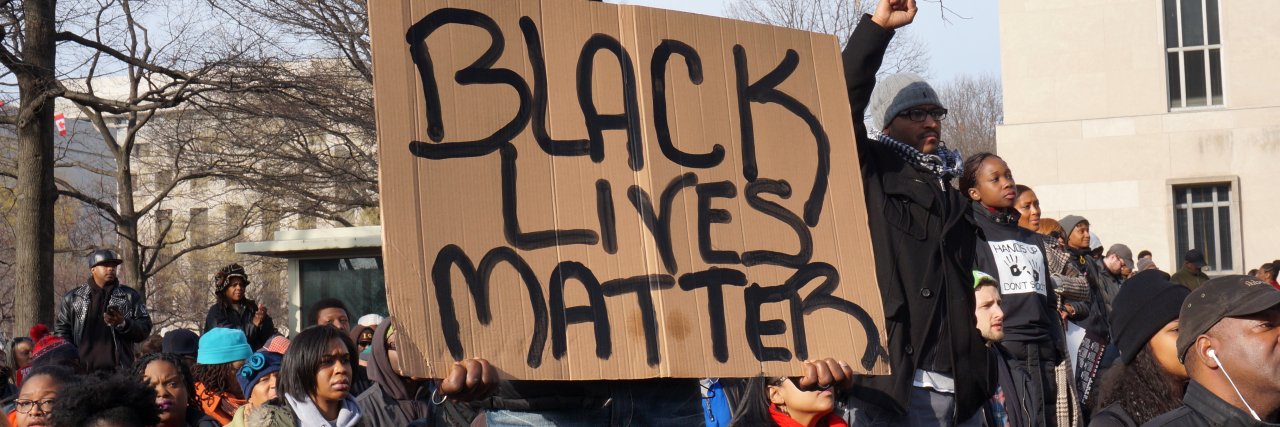4 Reasons Why Disabled People Should Support Black Lives Matter
Since the murder of George Floyd by Officer Derek Chauvin, people of all races, cultures, genders, ages and socio-economic statuses are raising their voices across the globe in support of Black Lives Matter and against systemic racism and police brutality. Racism impacts everyone, including disabled people. We should be doing all we can to support anti-racism, and here are four reasons why:
They Showed Up for Us
The Black community was instrumental in the fight for disability rights. During the 504 Sit-Ins in 1977, approximately 120 disabled people occupied the HEW building in San Francisco for 25 days straight. They were unable to contact the outside world or bring in food and supplies. The Black Panthers came to their aid, providing daily home-cooked meals for the protesters, an entirely altruistic act that provided the protesters the resources they needed to stay the course. We need to now join the Black community in their current struggle, not only to repay their support 30 years ago, but to continue to fight to improve the civil and human rights of all groups marginalized and oppressed by the state and systemic discrimination.
Many Black People Are Disabled
…which compounds the disadvantages they face on a daily basis. One in four Black people have a disability. Half of Americans who have been killed by the police had a disability. Black Americans are two-and-a-half times more likely to be killed by police than White Americans. And this is just the tip of the iceberg.
Most people with disabilities cannot afford a strong defense lawyer. Some are unable to assist in their own defense and are wrongfully convicted or serve harsher sentences. Many are denied medical treatment and mobility aids while in custody. Many are segregated or isolated for long periods during incarceration. Recently, the excessive use of tear gas, rubber bullets, batons, and physical force against protestors, reporters and bystanders has highlighted how police encounters often leave people permanently disabled.
Ableism Has Much in Common With Racism
I am not saying that ableism and racism are the same, but there are many parallels between the experiences of Black people and disabled people. People with a disability experience systemic discrimination regularly. We have been feared, pitied, mocked, excluded, and met with distaste, condescension, dismissal and platitudes. Many of us live in poverty and have less access to education, job, and healthcare. We have been misrepresented and underrepresented in media and entertainment. Our stories and accomplishments have been appropriated and used as inspiration and “feel goods” for non-disabled people. We and our disabilities have been fetishized, demonized and infantilized. And these forms of discrimination are compounded for Black disabled people.
Police officers, health care workers and people who work in the legal system are undereducated and untrained in how to interact with disabled people. Having had these experiences and faced these barriers, disabled people of all racial and ethnic backgrounds should feel compelled to support other human beings facing similar issues, and strive to build a society that is equal, inclusive and accepting of everyone.
What Hurts One Hurts All
One of the best qualities human beings have is the ability to collaborate and share ideas and resources with one another to improve life for all creatures across the globe. Whether someone contributes something that impacts the entire world, or simply impacts a single person in their community, it all matters, it’s all important. Each time someone is oppressed, marginalized, disabled, or killed, not only are they denied the opportunity to grow and flourish, not only do their loved ones suffer tremendous loss, but their community (and perhaps even the world) suffers the loss of their potential contribution to the future of human life.
We are social creatures, with the capacity for great empathy and compassion, and the knowledge and capability of creating a world where all lives truly do matter. We must continue to acknowledge mistakes, then learn and grow from them so that future generations of all races, genders, ages and abilities may flourish without systemic societal restrictions.
It’s not enough to be outraged by racism and police violence. It’s not enough to commiserate about experiences of discrimination. We can’t just sit back and say “I get it, but I’ve got my own issues to deal with,” or “it’s not happening in my country, so I’m not getting involved.” We must stand side by side with the Black community, raise our voices with them, listen to their lived experiences, support their businesses, donate to their programs, pressure our governments to be accountable, and use our privileges to help put an end to racism and discrimination against all marginalized groups.
Getty image by Coast to Coast.

